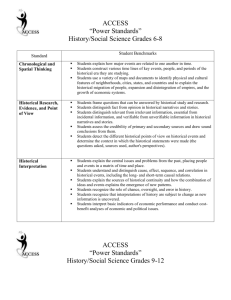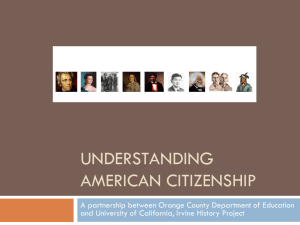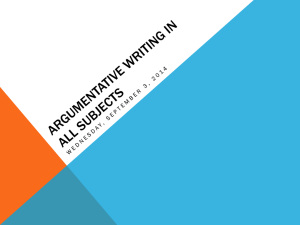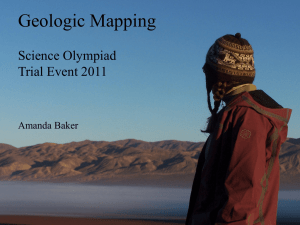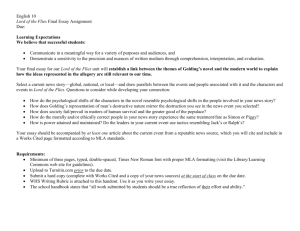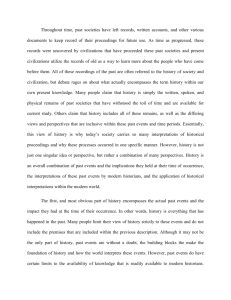Some thoughts about progression in relation to historical
advertisement
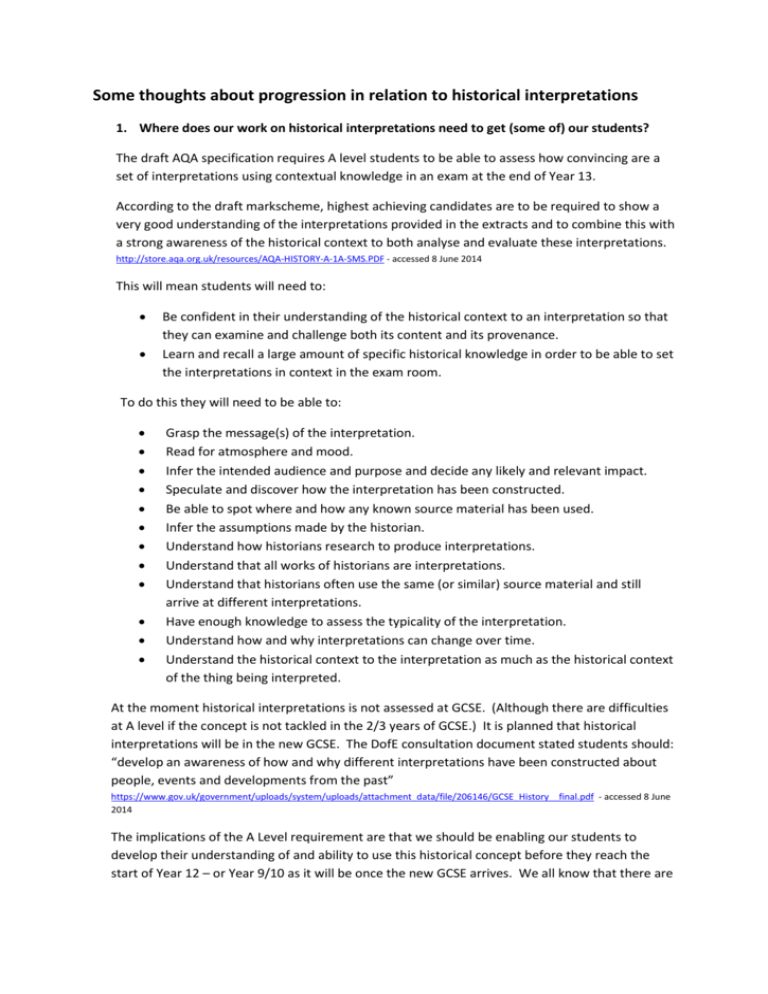
Some thoughts about progression in relation to historical interpretations 1. Where does our work on historical interpretations need to get (some of) our students? The draft AQA specification requires A level students to be able to assess how convincing are a set of interpretations using contextual knowledge in an exam at the end of Year 13. According to the draft markscheme, highest achieving candidates are to be required to show a very good understanding of the interpretations provided in the extracts and to combine this with a strong awareness of the historical context to both analyse and evaluate these interpretations. http://store.aqa.org.uk/resources/AQA-HISTORY-A-1A-SMS.PDF - accessed 8 June 2014 This will mean students will need to: Be confident in their understanding of the historical context to an interpretation so that they can examine and challenge both its content and its provenance. Learn and recall a large amount of specific historical knowledge in order to be able to set the interpretations in context in the exam room. To do this they will need to be able to: Grasp the message(s) of the interpretation. Read for atmosphere and mood. Infer the intended audience and purpose and decide any likely and relevant impact. Speculate and discover how the interpretation has been constructed. Be able to spot where and how any known source material has been used. Infer the assumptions made by the historian. Understand how historians research to produce interpretations. Understand that all works of historians are interpretations. Understand that historians often use the same (or similar) source material and still arrive at different interpretations. Have enough knowledge to assess the typicality of the interpretation. Understand how and why interpretations can change over time. Understand the historical context to the interpretation as much as the historical context of the thing being interpreted. At the moment historical interpretations is not assessed at GCSE. (Although there are difficulties at A level if the concept is not tackled in the 2/3 years of GCSE.) It is planned that historical interpretations will be in the new GCSE. The DofE consultation document stated students should: “develop an awareness of how and why different interpretations have been constructed about people, events and developments from the past” https://www.gov.uk/government/uploads/system/uploads/attachment_data/file/206146/GCSE_History__final.pdf - accessed 8 June 2014 The implications of the A Level requirement are that we should be enabling our students to develop their understanding of and ability to use this historical concept before they reach the start of Year 12 – or Year 9/10 as it will be once the new GCSE arrives. We all know that there are enough challenges for students re KS3-4 and KS4-5 transition, without meeting second order concepts of the discipline for the first time. 2. What do we need to do so students get better at historical interpretations? There are clearly stages involved in working with an historical interpretation (or a representation - such as an image). If our Year 13 student hasn’t grasped the message of an interpretation, they are clearly going to struggle to decipher how it has been constructed. However, having seen a lot of lessons in schools around the area in the last few years, I am more and more convinced that it is pointless to adopt a purely levelled approach, for example: At Year 7 most students will be able to identify and describe differences between historical interpretations At Year 9 most students will explain … etc Why do I think it is pointless? Because, while there are stages of sophistication involved in learning to work with historical interpretations, there are also crucial other factors, namely: Independence – how much scaffolding does a student require to achieve? Complexity – how complex is the interpretation and also the contextual material required to interpret it? Quantity – the amount of material, but also the amount of other things the students is required to do at the same time? I have seen Year 7s achieve evaluation of interpretations and I have seen Year 13 fall apart trying to understand what an interpretation is saying. Of course, the Year 7 is not more competent as a historian than the Year 13, it is a matter differing degrees of independence, complexity and quantity. I suppose one could write a generic description of what students should be able to do with historical interpretations and then say, ‘no’ , ‘some’ and ‘total’ in relation to independence (and the equivalent for complexity and quantity). However, progression is then not directly about the elements of historical interpretation. Instead, I think any markscheme that measures progression in the second order concept of historical interpretations must be task-specific to be helpful to students and useful to us. That said, we still need to be clear what we can do to help students to get better at historical interpretations. This is what Christine Counsell suggests we need to be doing in lessons: Making it explicit that history is about interpretations all the time. Build a culture of speculating why, how, where and for what interpretations are put together. Never separate work with interpretations from the application of knowledge. Keep the interpretation enquiry focus on the interpreter. Don’t get into more moral aspects such as ‘good’ and ‘right’, but stick with ‘how did it come about?’ ‘why does it matter?’ sort of questions Evaluate interpretations based on what they are designed to achieve. Always expect pupils to question audience and purpose, to comment on how an interpretation seems to fit with other interpretations, to fit with their knowledge etc. Develop a set of techniques they can use for analysing all text and always refer to it. Imagine other endings, other music over a film etc. Don’t overload the info when wanting them to focus on the interpretation’s structure, the processes etc. Work often with real historians interpretations. Christine Counsell – for Cambridge PGCE 2012-13 (NB: Christine has a plenary on interpretations at the 2014 SHP conference) From my work with Euroclio, I’ve also come to see these four points as crucial to always keep in mind about historical interpretations: 1. They are usually made after the event not during it. They incorporate some evidence about the impact of the event. 2. Interpretations are essentially secondary sources and therefore the process of analysing interpretation is pretty much the same as analysing any other kind of historical source. If that is so then interpretation and evaluation are inextricably linked. 3. What is omitted from the evidence is just as important as what is included. 4. The work of historians is not the only form of historical interpretation open to us. Mass media, art, poetry, posters, postcards, etc. can all offer interpretations as well. The new A level specifications seem to imply that the interpretations of historians will be on the exam papers. I think just focusing on interpretations of historians from Year 7 would be missing some great stuff and also could end up giving interpretations the reputation for being hard. Historians can be big, scary authorities for young people to challenge, and in many cases they just won’t know enough to make much headway. So, let’s use the teatowel, the postcard, the postage stamp, the film clip, the comedy show (yes, Blackadder Mr Gove!), the museum exhibition, the Sunday supplement etc. etc. 3. An example of WW1 interpretations on a similar for two different Key Stages An A level 3500 word independent investigation question could be: “To what extent was remembrance of World War 1 in the 1930s shaped by political ideologies?” The student would have to independently research academic texts and source material about the topic across several countries and identify a range of ways the War was being remembered (or not) within those countries. They would then have to research the range of motives for remembrance (or not) and judge to what extent political ideology was a driving force. In the course of 3500 words, the student has to: Analyse and evaluate, in relation to the historical context, different ways in which aspects of the past have been interpreted. http://filestore.aqa.org.uk/resources/specifications/AQA-HISTORY-A-LEVEL-SP-DRAFT.PDF - accessed 8 June 2014 An example of a Year 9 enquiry on the same theme could be: Why were Europeans remembering World War One so differently from one another in the 1930s? This would require lesson input on outcomes of World War 1: war dead, treaty decisions etc. etc. Students could then work with a selection of interpretations produced in the 1930s from varied European countries: UK (say something from Testament of Youth and a view of Armistice Day by the 1930s), Germany (say Hindenburg’s speech at the opening of the Tannenburg Memorial and All Quiet on the Western Front for contrast), Russia (nice bit of Marxism!), Turkey (WW1 is part of the foundation myth). They would need to work out what they were saying and what parts of the war and its outcomes they were focusing upon. (A less text based alternative set of interpretations would be to look at the style of memorials being put up in the 30s and the style of commemoration services at these memorials.) Then students would need info on the people writing and their milieu/location, e.g. on Vera Brittain, to help them contextualise further. Therefore it should be possible to design an activity where different reasons for remembering the War can be drawn out and categorised. Students can work with single interpretations on the bullet points in section 1 (above) to practise their skills as part of these lessons. An extension of this activity could be to look at how the War is being viewed in these countries today (e.g. Germany it has lost attention due to WW2, here it’s huge and diversely interpreted, in Russia there is a new Moscow memorial park just opening – a very different narrative from the pre 1990 one.) Here are some useful websites with further reading about interpretations of WW1: http://www.bbc.co.uk/history/worldwars/wwone/perceptions_01.shtml http://www.opendemocracy.net/article/how-we-remember-them-the-1914-18-war-today http://www.h-net.org/reviews/showrev.php?id=24744 Helen Snelson, June 2014
